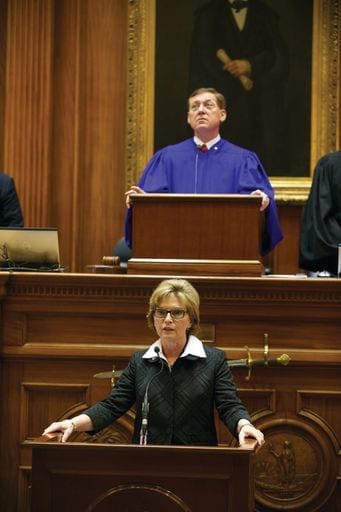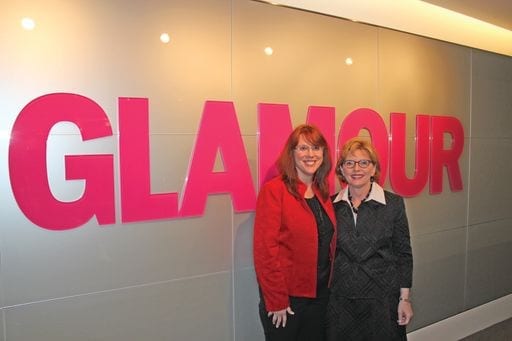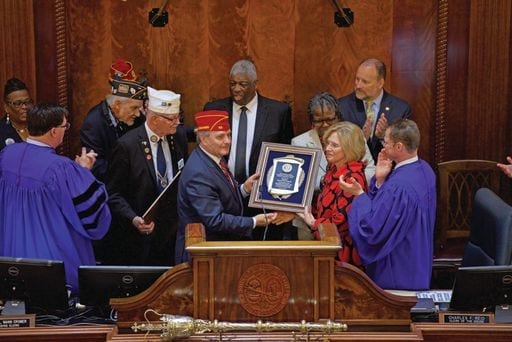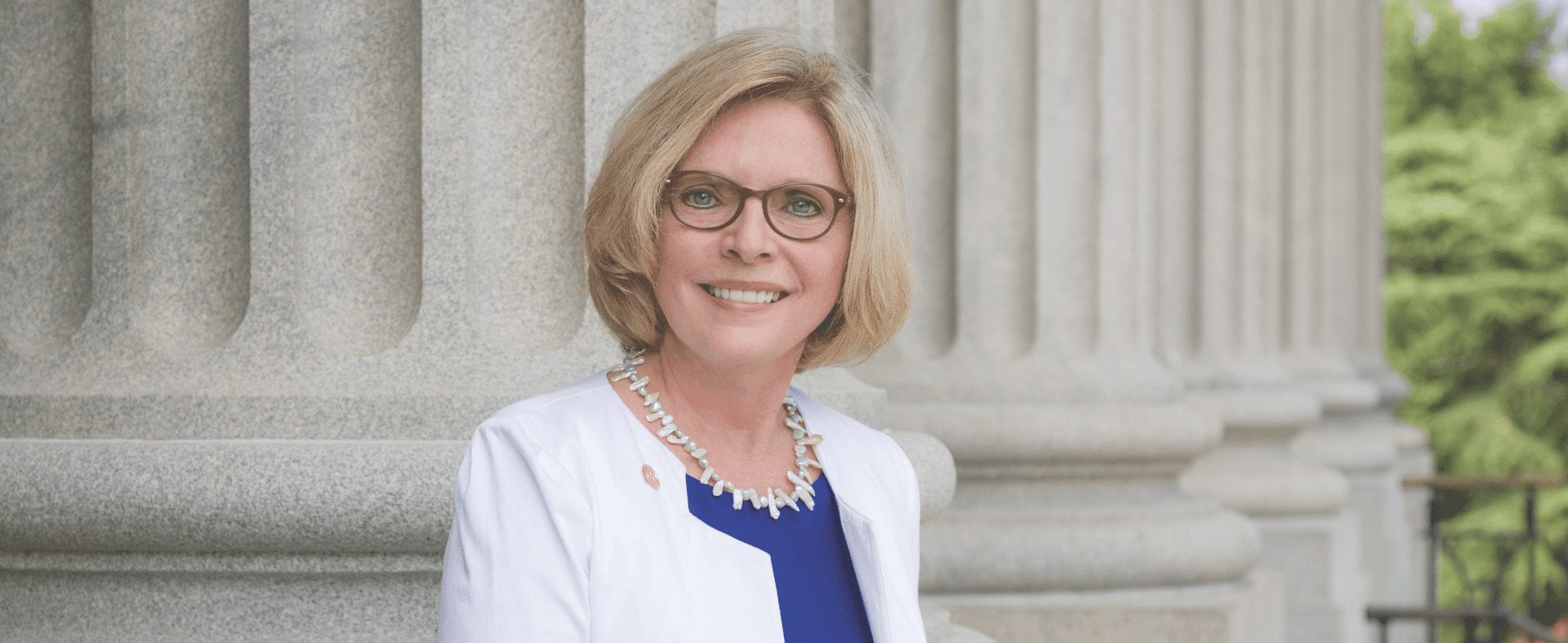South Carolina Senator, Founder of Katrina’s Kids
What was your father’s occupation?
My father was an entrepreneur and a grocer. He started out in the grocery business, and then he bought his own grocery store franchise. He wanted to own his own business. He worked for Powers Food Store, which later became Winn-Dixie, but there were no ownership opportunities with Winn-Dixie. When he found out he could own a Piggly Wiggly franchise, he bought a franchise in Leesville. He later built his own Piggly Wiggly in Batesburg.
A significant part of your career has been in insurance. Why insurance?
That’s another part of my father’s history. He also bought an insurance agency. He was a great businessman. He bought his own insurance agency, and I went to work for him while I was still in high school. I also worked in the grocery business being a bag girl first starting at age 13. I decided that I wanted to do something different than the grocery work, so I went into the insurance business with him while in my junior year in high school. I stayed in the insurance business and am still working today as a consultant. It was just a natural fit.
Did your other family members join your father’s insurance company or grocery store business?
No, my sister worked in the grocery business for a while when she was younger, but no one followed in mother and father’s footsteps. My mother worked in the grocery business with my father as the bookkeeper and was also at the Winn Dixie where she and my father met in 1948.
Your mother was revered for her strong work ethic. By watching her work alongside your father in the grocery business, did that change your aspirations?
I think it did. When I grew up, extended families lived together. My grandparents actually lived with us because my grandfather had had a heart attack. Before that, he worked in the cotton mill. They moved in with us, and they took care of us while my parents worked.
How old was your mother when she died?
My mother died when she was just 40 years old.
How old were you at the time?
I was just 15 when my mother passed away. I missed mother and daughter interaction as a teenager. She had cancer and was sick for probably about four months. She died in 1970. We weren’t as advanced with cancer treatment back then. Today, she would probably have lived longer because there are more treatments, and some could even be cured. In 1970, it was not possible because the lung cancer had metastasized to her bone and her brain before it was found. She was diagnosed in August and died in December. I didn’t have that mother figure growing up interacting with me during my teenage years, but I had a very strong father that stepped in, and it really helped me.
Your world was turned upside down at the age of 15?
Definitely. My mother passed away just 21 days before my 16th birthday.
How was your father able to navigate through that?
My father was a strong man. My parents were never very emotional people. We never saw them fight or even get in a disagreement. My dad took over after that. He became a stricter father after my mother passed away and took over the role of mother and father. He did get married again a year and a half later. I think he always needed a companion. My father has passed away, but my stepmother is still alive. While we weren’t close when I was younger, we have grown closer over time. I felt she couldn’t fill my mother’s shoes. I think all young girls, especially at that age, feel that way
Did not having your natural mother during your teenage years impact the way you raised your children?
I don’t know. I just have one daughter.
How many grandchildren total?
That’s a long story too. This is the second marriage for both my husband and me. Between us, we have three daughters. My husband has two, and I have one. We have five grandsons-total; five grandsons, and if you look far enough, we have two great granddaughters and one great grandson. I’m really not that old, but just so you know, my daughter and I have a very close relationship. I think I value that relationship so much because I didn’t get to have that with my mother. I think about all the times that my daughter and I spend with each other now. What would it have been like had I spent that time with my mother after age 15? My daughter and I have done so many amazing things together. Every year now, we take a long weekend and go Christmas shopping and have done that for the last 15 plus years. I never had those good times with my mother, so I cherish those times with my daughter.
Never able to close or complete that mother-daughter circle?
Right.
Your mother passes, and your father remarries. What next and why?
I went straight into the insurance business with my dad. I went to Hartford, Connecticut and got my insurance license. I never received a four-year college degree and have stayed in the insurance business all this time.
Was that a good decision or a bad decision?
At the time, in 1973, it was probably a good decision because I made as much money as a college graduate for that day and time. I made a good salary for a woman at that time, and I moved up the ladder quickly. Do I think it is a good idea? I would never tell a person graduating from high school, “Don’t go to college.” But, at that time in my life, it was the best thing for me.

Take me through your career trajectory.
When I first started in the insurance business, I worked with my father’s company, which was property and casualty insurance and just general insurance. When my dad sold the agency, I was not at a time in my life where I felt like I wanted to own an agency. I had just had my daughter. So, I just moved and went to work for someone else. Then, I went to work for Davis Garvin Insurance Agency. My career there lasted for 30 years. I planned on dying at Davis Garvin Insurance Agency. I became one of the first female underwriters for Lloyd’s of London, underwriting insurance for the Forest Industry. When I was elected to the Senate seven years ago, it just didn’t work out. They didn’t see how it would work with me not coming to work from 8:30 to five o’clock every day. The Senate is not supposed to be a career but a part-time job, so it doesn’t pay like a full-time job. But, the Senate really is a full-time job if you do it right, so I went to work for Keenan Suggs as a consultant because I didn’t have time to get out and sell or sit behind a desk everyday.
You were the only woman in many insurance boardrooms, particularly in the forest industry?
At first, they didn’t pay any attention. I experienced that in a lot of the places I have worked. Somebody once said, “If they don’t give you a seat at the table, you take a folding chair and pull it up yourself.” That’s what I’ve had to do a lot of times. When you learn your job really well, and you know it better than anybody else, they have to pay attention to you. All my life, I’ve worked really hard to do my job better than anybody else. That’s what I did at Davis Garvin. When I went there, I learned the forest industry better than anybody else. Not a lot of people in South Carolina handle that type of insurance. You could set yourself apart from everybody else, be different and be that person that nobody else was. I learned what a fellerbuncher, a skidder and a loader were, and how to pull logs out of the woods. I learned how to underwrite and set rates on those. When nobody else knew how to do it, I could pull it out of my head. People called me from all over the United States wanting me to do that for them. When they had a meeting, eventually they had to ask me to go because nobody else really knew the business. When we would go to the forestry convention, they had to take me to the convention because I knew the answers to the questions. That is how I moved up the corporate ladder.
What’s the moral of that story?
The moral of that story is this: I think women have to work twice as hard to get to the same place as men. I don’t mind the journey. I don’t mind working twice as hard. I do expect, when I get there, to be recognized for what I do.
Were you lonely during those times?
Yes.
When you entered the political fray, your life drastically changed. Can you take me through the decision to run for political office?
The first time I decided to run for the state Senate, I was Chairman of the Republican Party in Lexington. We tried really hard to get someone to run against my opponent, but nobody would run against him because he was a bully. He had a lot of money and a lot of power, and nobody would run against him. Nobody. I mean he was a Republican. I was a Republican. But he didn’t represent the things that we thought the Republican Party represented. I said, “Well, you know what? I will run against him.” Everybody said, “You can’t. Why are you going to do it?” I said, “What will it hurt? The worst thing that can happen is he beats me.”
But you knew his reputation?
I knew his reputation. I knew it was not going to be easy. I knew that he would say bad things about me. He would talk about me. He would probably bash me. He would make up things about me, which he did.
Your race for the Senate was the most vicious South Carolina has ever seen.
It was the worst personal bashing. It was the most expensive campaign to that date that South Carolina had ever seen. He spent money he didn’t have. He won the primary with 437 votes in a 110,000 vote district. In the runoff, it came down to busing people to the polls that had never voted before. He beat me the first time.

Did you think that you would win?
I thought I had a good chance the first time. I really did. It would be foolish to go into a fight thinking you will lose.
Were there moments during that race that you were surprised?
Yes.
And what were those moments?
I had to work very hard for campaign contributions because people were afraid to donate. They said, “If you don’t win, and we give you money, he will see that on your disclosure, and then he will take it out on us when he gets reelected.” That was people’s logic. “Why should we donate to you because we will pay for it later?” I think that probably hurt worse than anything else because they knew I was the better person. I think God has a plan for everything. I don’t think I was ready yet.
When the results came in, and you lost, how did you feel?
I was fine until I went to sleep that night. I woke up in the middle of the night with the biggest hole in the pit of my stomach. If you lose a race, and everybody that’s ever lost a race knows how it feels, when you wake up in the middle of the night, you think what am I going to do in the morning? I went straight back to Davis Garvin.
What precipitated the decision to run for the same seat again?
The next day, he was so cocky. “I told you she couldn’t win, and I beat her.” At the next Republican women’s meeting, his wife actually came across the desk wanting to fight me. I thought, “There is just something wrong with this.” You know what? I have four years. If I start working now, I believe I can beat him next time because he didn’t beat me by that much. I figured, why not? I started working right then. I campaigned anyway and worked hard for two years, and I began picking up momentum. The State changed their filing procedure, and I filed electronically but didn’t fill out the paper form for my Statement of Economic Interest. Because I filed wrong under the new law, I was kicked off the ballot after doing all this work. We took the case all the way to the Supreme Court who held that everybody else that filed electronically would be kicked off too. 230 some odd people in the state of South Carolina were kicked off the ballot. In order to get back on the ballot, you had to run as a petition candidate. In my case, I had to get over 5,000 signatures, and they had to be certified by the Election Commission. I got 10,000 signatures of which 7,000 were certified. A lot of people didn’t get back on the ballot that year because they weren’t going to do that work. In the state of South Carolina, I was the only petition candidate that actually got back on the ballot that won. Because we weren’t Republicans or Democrats, but just petition candidates, I had to go back and teach people how to vote for a petition candidate. In the last six weeks of that election, I knocked on 20,000 doors in six weeks. I know how many doors I knocked on because I had 20,000 pieces of campaign literature that we called a Big Sign Letter. On one side, it looked like a sign, and on the other side, it had everything you ever wanted to know about Katrina Shealy but were afraid to ask. I took them door-to-door, and I handed them out. I had people nailing them on trees, nailing them to their front porch. I mean it was a campaign like you’ve never seen. I had a lot of volunteers who were kicked off the ballot in other areas helping me because they were that mad at him. We beat him by 10 percent.

Have you seen him since then?
I have, and actually, he told me the other week I was doing a good job.
Were you frightened?
The time I was most frightened was when he started threatening me and telling me I would be arrested because I hadn’t done my paperwork right. Until I got that straightened out, I would go in my den at night after my husband went to bed because I didn’t want to scare my husband. I would get on my knees, and I would pray. He had me that scared.
Did you talk to anyone?
I didn’t want anybody else to think I was scared because they would have tried to talk me into getting out of the race. People asked, “Why don’t you just get out of the race and run again in four years?” No. I had worked too hard and come too far. I was not getting out
How did it feel to be the only woman elected into the South Carolina State Senate?
That was scary, I won’t lie. There are 46 senators, and 45 of them were men. I had a lot of them telling me what I should do, how I should be, and what it was going to be like. One of the senators told me, “I’m the smartest person in here, and you need to listen to me and do what I say.” I’m thinking, “No, that’s probably not true.” The Senate is very formal. When the Sergeant in Arms entered with the sword, they would always say, “Gentlemen of the Senate, please rise.” They kept forgetting I was there. I’d think, “Well, they’re not talking to me undoubtedly.” It was funny. Senator Sheheen would call attention to it, and say, “Hey, I think we have a lady in here now.” Then they would go back, which made it worse, and they’d say, “Lady and gentlemen of the Senate, please rise.” Everybody in the balcony would start looking around to see where the lady was. We finally got them to say, “Members of the Senate, please rise.”
You were the first Republican woman to chair a major committee in the Senate.
Yes, and I am very proud of that. We also finally changed the committee name. It was called The General Committee, which I thought was very general. Senate committees are by seniority and the majority party. You have to stay on a committee to move up. So, if you stay on a committee, you move up in seniority, and then eventually you become the Chair. Well, nobody wanted to be on the General because nobody really knows what it does. It’s actually in charge of the Department of Social Services and Veterans’ Affairs. They weren’t utilizing this committee, but when I got there, we actually started doing something. I don’t think it was because men don’t care about children’s issues and family issues, but it’s not very– it’s not a very sexy thing to work on. You know, children’s issues, family issues, nobody wants to really get out there and dig into that, and it’s something that I’ve put on the forefront of what I do. And so we started the subcommittee to investigate the Department of Social Services. We’ve worked hard on veteran’s affairs. We’ve worked hard on things that matter. So, I stayed on the committee, while everybody else, when they would get a chance to get off, would get on banking and insurance or something more glamorous. When Senator O’Dell passed away, Senator Bryant moved up as Chairman. Well, I was next in line after Bryant. When Bryant became Lieutenant Governor, I became Chair. I was watching that list, and I knew if I stuck it out, I would become Chair. We have really elevated this committee now, and we’re doing a lot of good work.
And they renamed the committee?
Today, the committee is the Family and Veterans’ Services Committee instead of General. Now, everybody wants to get on the committee because we have veterans there. It looks good to have that assignment. We even had some senior senators who have come back on this committee which puts them down at the bottom because if you move back to a committee, you go back to the bottom.
What is Katrina’s Kids?
When we started the subcommittee to investigate the Department of Social Services, Senator Joel Lourie and I were dead set on trying to make that a better agency. In the process of doing that, we heard testimony from so many people about things that were wrong at the Department of Social Services. One of the things we found out is there is this huge financial gap in what the Department of Social Services can do for children, as a state agency, and what foster families can do. The State cannot fund sending a child to summer camp, ballet lessons, karate classes or just the fun things that kids naturally would like to do. They just don’t have the money and often times, neither does the foster family, who may have their own children or maybe two or three foster kids. They just cannot afford extracurricular activities. That’s what we do. We pay for that. All they have to do is fill out an application. We have yet to turn anybody down. It would have to be something really crazy for us to turn it down. We have even bought braces. Social Services would only pay a portion, so we finished paying for them. We’ve bought band instruments, things that kids really want to do, but the State can’t pay for, and the families can’t afford. And we’ve touched a lot of lives. Just last year, we sent over 300 children to summer camps. We have a big fundraiser every year. Last year, the fundraiser was held at Spirit Communications Park and we just completed another fundraiser in the Vista where we raised over $40,000 at one event. We serve children all over the state, and we do something in every county.
What life lesson can you share with a young woman?Advice that has served you well?
Don’t ever give up. No matter how hard you think something is, no matter how hard it looks ahead of you, and no matter what people tell you. If they tell you, “You can’t do it,” take that as a reason you can. If somebody tells you to stop, prove to them you can do it because sometimes that’s the best feeling at the end of the day. When you can’t do something, and somebody says, “Ah, you need to quit,” try again later. Just keep trying because you can do it. You might not win the first time you try something. It might take another chance, but never give up on something you think is the right thing to do. Did I ever think I wanted to be a state senator when I was 20 years old? No, that wasn’t on my bucket list of things to do. But now that I’ve done it, it’s the best thing I’ve ever done. Do I think I’ve done the right thing for children and families and people in South Carolina? Yes. I wouldn’t give it up for the world. How long will I be here? I don’t know. But I will keep doing as much as I can as long as I’m here.

